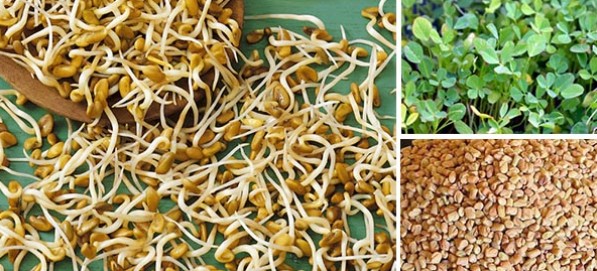Helpful Nutrient Info from the Field of Master Mind Herbs (MMHRB)
Shared from the nutrition lab of: Joseph Mercado
Article Author: Diane – Ask-A-Prepper
To: Health Lover
Blog Post #1175
Re: Fenugreek Benefits
Date and Time: Friday, June 4, 2021 at 2:59 a.m.
Dear Herbal Lover,
There are several herbs and spices that can be used effectively for controlling blood sugar.
Cinnamon, cloves, ginger, turmeric, marjoram, ginseng, cayenne, garlic, rosemary, oregano, sage, curry leaves, and Fenugreek are common food flavorings that are active in reducing blood sugar.
Using these foods alone or together can make a significant difference in blood sugar levels in a short time.
All of these have been used successfully in the past and scientific studies show their value for diabetics.
One of the most effective and one that I have recently begun to use is fenugreek seeds.
Fenugreek is an aromatic plant with medicinal and culinary uses. It is native to India and the Middle Eastern countries.
It is a common ingredient in Indian cuisine and alternative medicine.
The Basics of Blood Sugar Control:
Your digestive system converts the food you eat into glucose for use as an energy source for your cells.
Maintaining enough glucose is critical for good health.
However, when the glucose levels are too high after a meal or stay elevated for a long period of time, it can do damage to the body systems.
Insulin is a hormone that helps move glucose from the blood into the cells when needed.
When your blood sugar is high, your pancreas makes more insulin. Over time the pancreas may be unable to keep up or the body may become less responsive to insulin.
Either situation can result in Type 2 Diabetes and cause serious damage to the nerves, blood vessels, and body organs.
How Fenugreek Affects Blood Sugar:
How to Lower Your Blood Sugar Levels with FenugreekFenugreek acts in three major ways. First, it improves insulin production in the pancreas. Increased insulin helps move glucose from the blood into the cells.
Second, it slows the digestion and the absorption of carbohydrates in the body.
This action keeps the blood sugar levels under control and reduces the blood sugar spike in the body.
Finally, regular use of fenugreek increases insulin sensitivity and may prevent diabetes.
What Studies on Fenugreek and Blood Sugar Say:
How to Lower Your Blood Sugar Levels with FenugreekA 2009 PubMed Study showed that patients who took 10 grams of soaked fenugreek seeds daily experienced a reduction in fasting blood sugar, triglycerides, and LDL cholesterol.
Fasting blood sugar was reduced by 25% on average in patients consuming the soaked fenugreek seeds.
Another study tested using fenugreek seed flour in baked goods.
When compared to whole wheat bread, fenugreek bread reduced insulin resistance in Type 2 Diabetics.
Studies with Type 1 Diabetics showed that patients taking 50 grams of fenugreek seed powder with both lunch and dinner.
Patients experienced blood sugar reductions within 10 days.
Patients also exhibited a 54% reduction in urinary glucose excretion.
Total Cholesterol, LDL, and VLDL cholesterol and triglycerides were also reduced significantly.
Non-diabetic patients taking fenugreek experienced a 13.4% reduction in blood sugar levels 4 hours after use.
Side Effects and Cautions:
Fenugreek is generally considered safe, but overuse does have some effects on the body.
Some users experience mild stomach upset or bloating.
Pregnant women should avoid fenugreek, since it stimulates uterine contractions and can cause a miscarriage.
Fenugreek interacts with some prescription medications.
Consult your doctor if you are taking medications for diabetes or blood thinners.
How to Take Fenugreek for Blood Sugar Control:
Clinical studies have shown effective doses begin at about 5 grams of seeds or 1 gram of extract per day for the reduction of blood sugar.
Soaking the seeds overnight in warm water increases their effectiveness.
How to Lower Your Blood Sugar Levels with FenugreekOther studies show that 100 grams of seed powder daily, divided into two doses and taken with lunch and dinner reduces fasting glucose levels.
Dried or fresh fenugreek leaves and seeds can be eaten or used for tea.
I choose to put about a teaspoon of fenugreek seeds in hot water and cover it overnight. I consume about half of the soaked seeds with my breakfast and refrigerate the other half until dinner.
Since I have begun doing this, my fasting blood sugar levels have fallen into the upper normal range and my blood sugar spikes are much better controlled. Overall my blood glucose levels have dropped over 20%.
Growing Fenugreek in Your Home Garden:
Fenugreek seeds are available online and in major garden centers. I’ll be starting some indoors in early March (I’m in Florida, so adjust for your area.).
How to Lower Your Blood Sugar Levels with FenugreekI’ll sow my seeds directly into biodegradable pot or trays, but you can also sow them directly in the garden.
When starting indoors, allow the seedlings to grow vigorously before transplanting or they may be too fragile.
The seeds sprout in four to seven days under ideal conditions. Ideal temperature range for germination is 50 to 90 F. Wait until after the last frost to transplant them outdoors. Water the plants in the morning, keeping the soil moist.
Grow fenugreek in full sun to partial shade in a well-drained bed. Start harvesting the greens within three to four weeks from transplanting or six weeks after sowing. Harvest the greens until the plant begins to flower.
The seeds are ready to harvest within 2 to 4 months. They grow in long pods. When the plant begins to die back and the pods turn yellow, the pods are ready to harvest.
Snap the pod from the stalk and peel the pod back to remove the seeds. Another way to remove the seeds is to rub the pods between the palms to separate the seeds from the pods.
Additional Health Benefits of Fenugreek:
Fenugreek is a nutritious plant, containing iron, magnesium, manganese, copper, vitamin B6, protein, and dietary fiber. It also provides antioxidants and phytonutrients. Most of the health benefits of fenugreek are believed to be due to the fiber content and the saponins it contains.
Lowers Cholesterol Levels:
Fenugreek consumption helps reduce LDL (bad) cholesterol levels and can prevent serious problems such as atherosclerosis, heart attacks, and the formation of blood clots, which leads to strokes.
Reduces Menstrual Discomfort and Menopause Symptoms:
Fenugreek seeds help relieve menstrual symptoms, menstrual pain, and reduces symptoms of dysmenorrhea.
It also relieves symptoms of menopause, such as hot flashes, sleep problems, weight changes, and vaginal dryness. A 2017 study verified that fenugreek helps relieve these symptoms by inhibiting the activity of testosterone.
Promotes Lactation:
Fenugreek tea is often recommended to help nursing mothers in cases where the mother is not able to produce enough breastmilk.
Anti-Cancer Potential:
Fenugreek has anti-cancer properties and is specifically linked to the prevention of breast cancer and colon cancer. Substances in the herb bind to toxins and protect the colon from cancer and other disease processes.
Kidney Problems:
Fenugreek is effective in treating various kidney conditions. It helps reduce calcification of kidneys and the risks of developing kidney stones.
Other benefits of fenugreek include:
- Appetite suppression
- Relieves muscle aches
- Soothes irritated skin
- Used in inducing labor
- Contains antioxidant properties
- Relieves constipation and aids digestion
- Treats sore throat, coughs, colds, and relieves mucus
- Treats asthma, hay fever, tuberculosis, sinusitis
- Improves the body’s metabolism and health
- Useful for treating wounds, inflammation, and gastrointestinal problems.
In the treatment of diabetes, fenugreek is a powerful ally.
Used regularly, the herb lowers blood sugar levels and reduces insulin sensitivity. To be effective, it should be used daily.
Used with a healthy diet and exercise, fenugreek can be a powerful intervention in helping prevent diabetes or treat existing diabetes.
However, it is important to use fenugreek in moderation because of the possibility of side effects.
Content Source: Ask-A-Prepper

 Email Us a Message
Email Us a Message 

Please send us a personal message below and we will serve you momentarily.
We appreciate you visiting the MMU Global Research Directory
For more blog posts, videos, articles, and to generate more knowledge, please feel free and…
 Disclaimer: Content on this site is for reference purposes and is not a substitute for advice from a licensed health-care professional. You should not rely solely on this content, PLenergy, Master Mind Health, and Master Mind Herbs assume no liability for inaccuracies. Always read labels and directions before using a product. Statements regarding dietary supplements have not been evaluated by the FDA, and these products are not intended to diagnose, treat, cure, or prevent any disease or condition.
Disclaimer: Content on this site is for reference purposes and is not a substitute for advice from a licensed health-care professional. You should not rely solely on this content, PLenergy, Master Mind Health, and Master Mind Herbs assume no liability for inaccuracies. Always read labels and directions before using a product. Statements regarding dietary supplements have not been evaluated by the FDA, and these products are not intended to diagnose, treat, cure, or prevent any disease or condition.






 Fly Over to the MMU Facebook Page with Hoot
Fly Over to the MMU Facebook Page with Hoot
 Visit the MMU Facebook Group Today
Visit the MMU Facebook Group Today